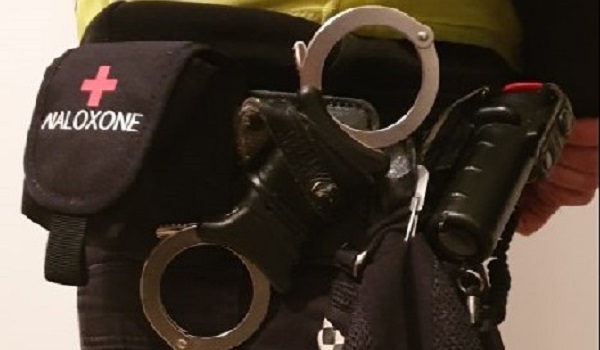Call for all officers to carry Naloxone as drug deaths reach record level
In response to nearly 5,000 drug-related deaths in England and Wales, the highest in 30 years, The Salvation Army wants all police officers equipped with Naloxone, a lifesaving nasal spray, which it says could save thousands of lives each year.
New annual figures released by the Office of National Statistics show that during 2022 in England and Wales there were 4,907 deaths related to drug poisoning, the highest number since records began in 1993.
Of these, 4,572 deaths were in England and 318 in Wales.
The figures show 2,261 drug-poisoning deaths involved opiates – just under half (46.1 per cent) of drug-poisoning deaths registered in 2022 – while 857 deaths involved cocaine, the 11th consecutive annual rise.
Naloxone, which can be given as a nasal spray or injection, temporarily reverses an opioid overdose to allow enough time for emergency services to arrive. The medicine is already successfully being used by some police forces, but only on a voluntary basis, says The Salvation Army.
Lee Ball, The Salvation Army’s director of addictions, said: “We know from our work that the use of drugs is often a way to cope with despair and distress due to trauma, poverty, and a sense of hopelessness. Every death that results from this is a tragedy, even more so when that life could have been saved.
“Naloxone is safe, simple and effective, and it’s quick and easy to use. With police officers usually the first responders in an emergency, equipping those on the front line to use Naloxone would save thousands of lives every year.
“But it’s also vital that there is adequate provision of a range of treatment services to support people to stay safe plus policies that address the root causes of addiction. It is not until we start to address the underlying conditions that we will be truly able to prevent the harm from the use of drugs happening in the first place.
“At The Salvation Army, we take a compassionate harm reduction approach, which means removing moral judgement from health and social care to support the person to address the cause as much as the consequence of their drug use. In this way, we have supported thousands of people to build a sense of hope for their future.”
To expand the use of Naloxone, The Salvation Army is calling for:
- All frontline police officers in England and Wales to be trained and equipped to administer and distribute Naloxone;
- NHS emergency departments, mental health trusts and ambulance services across England and Wales to issue take-home Naloxone kits for those at risk of opioid overdose; and
- A Government-funded national Naloxone programme for England, currently the only UK nation without one.
The Association of Police and Crime Commissioners (APCC) has been “strongly advocating the expansion of the use of Naloxone”, currently used by 20 forces and is working closely with the National Police Chiefs’ Council to host webinars to help better inform partners on its use and administration.
At Police Scotland, all frontline uniformed officers up to and including the rank of inspector have been trained and equipped with intra-nasal Naloxone.
APCC joint addictions and substance misuse leads, David Sidwick and Joy Allen, said: “These are sobering figures, and the fear is that the dangers will grow with the widely anticipated rise in the risks from synthetic opioids in the next 12-18 months – although clearly other drugs such as cocaine and heroin themselves remain a constant and present danger.
“There is a national drugs strategy in place to address these combined threats – including forensics and detection as well as cross-border activity designed to disrupt drugs and serious organised crime channels, and to deliver prevention, treatment and recovery.
“This is supported by record investment of nearly £900 million of dedicated funding over the Spending Review period, taking the total investment over three years to £3 billion. There are also emerging means to reduce the number of overdose deaths through the use of Naloxone which is being rolled out to police forces, prison and probation staff to administer, with strong support from police and crime commissioners (PCCs), which has saved 350 lives to date.
“PCCs are working closely with local authority, health and other partners through their local Combatting Drugs Partnerships to address this threat, for example, by developing local drug information systems – an early warning approach – but as these figures show, we cannot afford any complacency in the face of this ever-evolving threat.”


